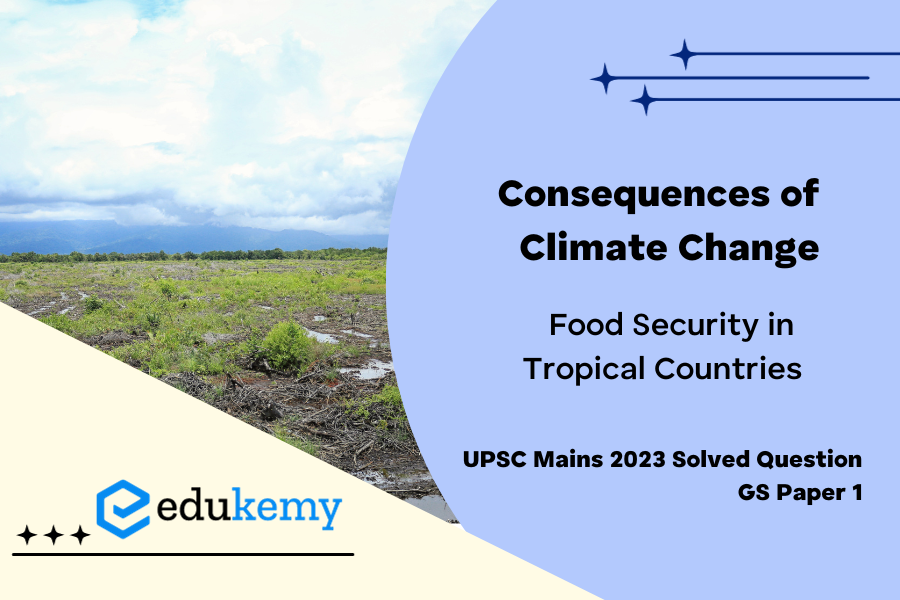UPSC Mains General Studies Paper – 1 Mains 2023
UPSC Mains Civil Services IAS Exam Question Paper – 2023
Contents
Introduction
According to a world bank report, about 80% of the global population at risk from crop failures and hunger from Climate Change are in sub-Saharan Africa, south-Asia which will have negative consequences on food insecurity.
Body
The consequences can be ascertained as:
A. Stressed availability of food:
- Heat wave: Rise in heatwave leading to poor quality of grains. E.g. short grain wheat production in India in 2022.
- Locust Attack: Increased prevalence of pest attacks. E.g.. locust attacks in Pakistan and India during 2018-2021. Haryana, M.P, U.P, Rajasthan reported crop damage up to 33% of sown area.
- Rising Sea Surface Temperature: Leads to migration of fish stocks towards colder waters leading to reduced catch. E.g. Erratic summer rains, cyclones, low-pressure areas and less rain in the monsoon interrupt the migration routes of hilsa fish near Odisha coast along with reduced near shore catch due to turbulent seas.

B. Rise in Inflation impacting affordability of food:
Supply chain disruption due to Crop failures:
- Extreme climatic events lead to disrupted food supplies and rising prices.
- Countries stopping exports leading to supply chain disruptions thus affecting accessibility of grains and price stability of food grains e.g. Indian rice and wheat export curbs leading to food crisis in Africa in 2022.
C. Health hazard affecting assimilation of food:
- According to WHO, climate change is impacting health due to extreme events such as heatwaves, storms, vector-borne diseases leading to increased frequency of pandemics and health hazards.
- This Leads to decreased assimilative capacity along with strain on food production eventually leading to imperiled food security. E.g., MERS,2012; Ebola,2014-2016 in west Africa.
D. Effects on Accessibility of food:
- Inflation along with crop failures put pressure on the public distribution system leading to poor accessibility of grains.
- Torrential rainfall along with humid weather leads to increased spoilage of stored grains. E.g. 2700 tonne food grains were damaged in 2017-18 in FCI godowns of India.
Conclusion
Therefore to improve food security, the need of the hour is to contain temperature rise within 1.5 Celsius( Paris accord) and adopt sustainable measures like Adoption of integrated farming system( pisciculture, horticulture) and Adoption of climate-resilient crops e.g. millets (Shree-anna); contribute to SDG-2 achievement of zero-hunger.
In case you still have your doubts, contact us on 8792740517.
For UPSC Prelims Resources, Click here
For Daily Updates and Study Material:
Join our Telegram Channel – Edukemy for IAS
- 1. Learn through Videos – here
- 2. Be Exam Ready by Practicing Daily MCQs – here
- 3. Daily Newsletter – Get all your Current Affairs Covered – here
- 4. Mains Answer Writing Practice – here
Visit our YouTube Channel – here


